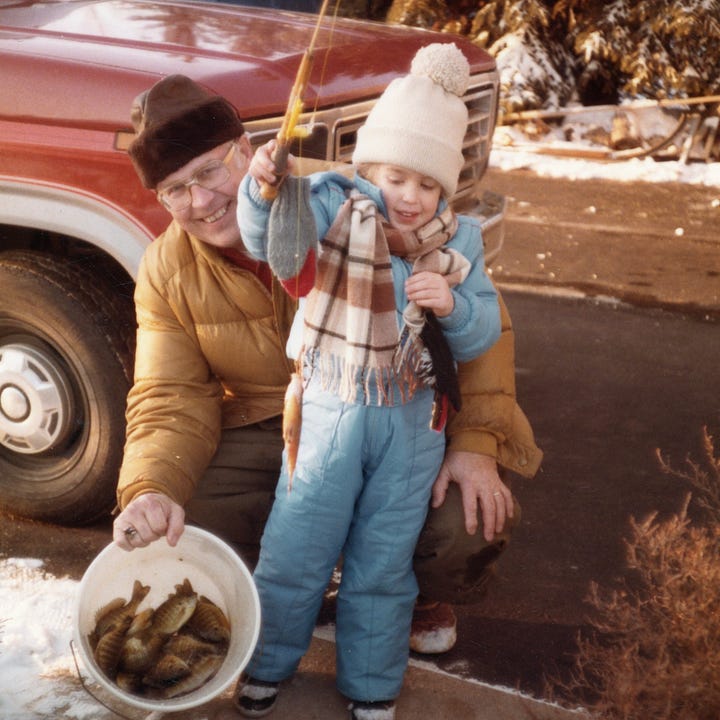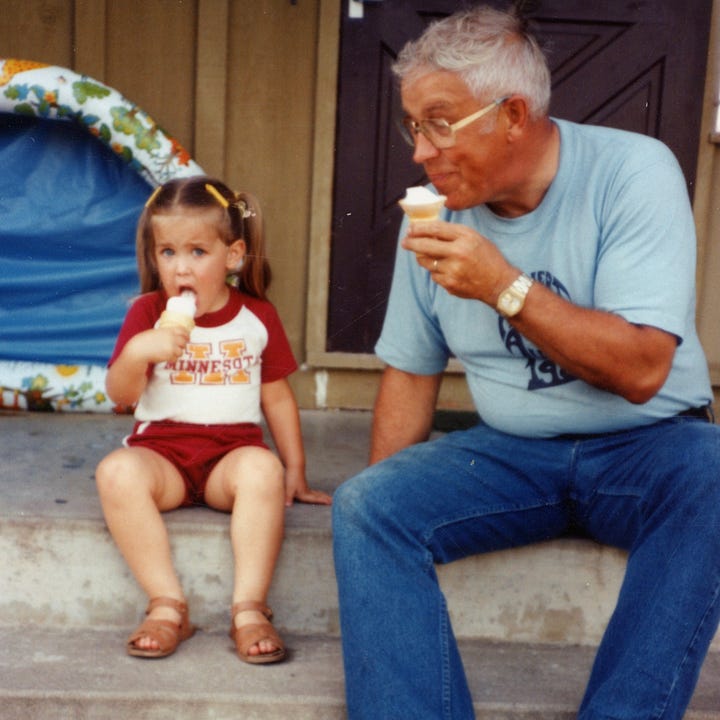An agitation of the air,
A perturbation of the light
Admonished me the unloved year
Would turn on its hinge that night.
~Stanley Kunitz
We are about to hit the road for a short trip to Minnesota, where my parents grew up, where I was born, and where most of my extended family still lives. So this note is probably a little less fully fleshed out and edited than usual, as I tab between writing, finishing bits and pieces of work, and making packing lists. Such is August. More on this strange, transitional month shortly.
First, I just have to note, out of regional loyalty, that the Land of 10,000 Lakes is having a moment, and I am here for it! I can’t recommend highly enough the value of finding yourself a retired midwestern teacher to take you ice fishing in the winter and out for Dairy Queen in the summer. Take it from me, hotdish is for everyone! We might not use a lot of spices, but have you ever had a mocha cake?


Okay, back to August.
I always get a little uneasy as these final weeks of summer wind down. Having spent the majority of my life on an academic calendar, there’s a slight reflexive tension that sets in as the first day of school edges closer, and the freedom of long evenings with fewer obligations begins its countdown. This doesn’t actually make a lot of sense, to be honest, because I love fall and winter (see midwestern roots above). Even as a child, I was always more at home in the rhythms of school than in summer camp, and I’ll take hot tea and crisp leaves over popsicles and sweaty subway platforms any day. Plus, now, for the first time in my life, I have more work obligations in the summer than at any other time of year. So, in reality, the balance of freedom to responsibility doesn't weigh in summer’s favor anymore, though my body still seems to expect it to, after decades in school buildings. These emotional routines linger like muscle memories. I do also have some vicarious melancholy on behalf of my son, who still lives very much by the dictates of the school calendar. I know he can feel alarm clocks and homework looming.
When he was in preschool, I remember one of the other moms saying that she felt like everything in parenting is happy-sad. There’s always this sense of excitement and letting go blended together in a wash of mixed emotions. We’re grateful when our children walk into school without looking back for the first time, but also a little wistful for the days when they needed us so much more unabashedly, sinking into our hugs like they were absorbing a vital resource by osmosis. My son is markedly taller than I am now, lanky and increasingly broad shouldered. It’s genuinely delightful to get to know the full fledged person he’s becoming, as he’s increasingly more his own than mine. Even so, I can still feel his round toddler cheek resting against my chest, his small, chubby foot cupped in my hand. In addition to mixed emotions, there’s an element of time blurring in all of this as well. It’s happy-sad and it’s also fast-slow. Everything all at once all the time.
It’s tempting to try to parse life into seasons, making these mixed emotions tidier by packing some into the boxes of yesterday and setting out the new as we anticipate and look ahead. But I think, much of the time, we live more in the muddy wash of transition than in any one place.
I have a vivid memory of walking to school with my father when I was around six and explaining that it was sometimes hard to be a kid, even though grown-ups seemed to think it was all fun all the time. I don’t remember what in particular had led me to wax existential on this particular morning, but I do remember feeling it as a general observation about life, not as a specific frustration directed at my dad. And I remember saying, with a flair of determination, that when I grew up, I wouldn’t forget this. In some ways, I think this was probably my origin story as a teacher. That morning, backpack bouncing against my small shoulders, I promised to remember that children are full human beings, and that what it means to be a full human being is to have rich and complex feelings. We are never just one thing, even when we are young.
I’ve carried this with me as a teacher and done my best to make good on my promise to that little girl in knee highs and braids. When I still led my own classroom, I had a reputation for being good at handling difficult separations, and I always tried to explain to parents and other teachers that the key was in rejecting the temptation to try to distract. So often, tearful children are confronted with exaggerated cheer, as adults attempt to entice them out of their tears with fresh playdough and magnatiles. I get this temptation. There is something almost primal about our desire, as adults, to be able to make children happy. But I always tried to take the opposite tact. I would say something along the lines of, “This is so hard. We don’t have to do anything right now if you don’t want to. I’ll just keep you company. You tell me when you’re ready to try something, and we can go together.” Sometimes we might write a note to the parent or caregiver the child was missing, but even this I would usually wait to suggest until their tears had subsided a little. Nothing is a magic trick that works every time, but most of the time I could feel children relax in my lap when I said these words. They wouldn’t jump right up, ready to play, but their tears and breathing would ease. The subtext is, “I hear what you’re trying to tell me. I won’t try to talk you out of it, and you’re not alone.” There’s relief in simply being heard.
There are generally two responses to the distraction approach when children are struggling to acclimate to a new environment. They either cry more loudly or they stifle their tears and do their best to fake it ‘til they make it. And aren't these fundamentally rational responses? If you were very clearly communicating your distress and were met with a response that was fundamentally on the opposite end of the emotional spectrum, wouldn’t you conclude that you either needed to communicate more loudly and forcefully, or give up on the person who seemed to be so evidently not getting the message?
There’s a passage in the book Pax by Sara Pennypacker that has stuck with me, since I read it to my son. The protagonist (a fox) is alone with an older, injured and dying fox, and the narrator writes, “Pax lay down shoulder to shoulder with the old fox, pressing tight in full company. He could offer only withness, but nothing else was asked.”
Sometimes I could alleviate children’s tears with an actual solution, a band aid or help negotiating over a toy. Ice packs cure a surprising array of ailments and big feelings when you’re three. But most of the time, I saw offering “withness” as my primary job. There’s something powerful, at any age, about the acknowledgement that sometimes company is all we can offer and all that is needed. It carries the comfort of connection. But, I think it is also a way of acknowledging the fact that, often, our feelings are muddy and intractable, at least for the moment, and there’s nothing more that can or needs to be done, other than to acknowledge that our messy experience is real and complex and sometimes uncomfortable.
One of the best lessons a child ever taught me was an emphatic declaration that normalizing difficult feelings doesn’t change the discomfort they create. This boy was extremely upset about something that had occurred in his classroom. His teacher had taken him into the hall to try to help him calm down, away from the eyes and ears of his peers, and I was listening peripherally as he stomped and cried. His teacher sat calmly and said, “It’s okay to be angry,” as I’m sure I have many times in her place. The boy stopped, and there was a notable pause before he shouted back at her, “It’s not okay with me!” I remember smiling at the blunt honesty of those words. Sometimes, in our valid attempts to help children express and accept a wide range of emotions, we forget that the experience for the child is still, “This feels really bad, and I don’t like it.” I’ve shifted my own language since this interaction. Now I try to say, “Everyone feels angry sometimes” or “I understand why you’re angry.” Because the truth is, he was right on point in his four-year-old fury. No matter how normal or acceptable emotions may be, they still feel the way they feel, and sometimes that is icky and not great. It is complicated and layered and at times uneasy, this experience of being human—of moving through time and navigating our own responses to other people and to the unfolding of it all.
So, as August fades, and we step into the Minnesota grass next week, I’ll be watching my son at every age, all at once. While shadows of his toddler self and his preschool self and his elementary school self intermingle with the teen he is today, I’ll be wistful and happy, anxious and excited, sad and grateful. I’ll be longing for just a few more summer days and eager for the crispness of fall.
Happy-sad, fast-slow. Everything all at once.
Wishing you a few more long, warm evenings and cozy days ahead,
Alicia
If you enjoyed this post and are not already a subscriber, please consider subscribing to Notes on Hope.
And if you think someone else in your life might enjoy reading Notes on Hope, please share. It’s always easier to hold onto hope when we’re not doing it alone.






“This is so hard. We don’t have to do anything right now if you don’t want to. I’ll just keep you company. You tell me when you’re ready to try something, and we can go together.” Sometimes we might write a note to the parent or caregiver the child was missing, but even this I would usually wait to suggest until their tears had subsided a little. Nothing is a magic trick that works every time, but most of the time I could feel children relax in my lap when I said these words. They wouldn’t jump right up, ready to play, but their tears and breathing would ease. The subtext is, “I hear what you’re trying to tell me. I won’t try to talk you out of it, and you’re not alone.” There’s relief in simply being heard.
This works with adults too!
So gorgeous and so true. For some reason, the essay puts me in touch with my teen-age self and how I must have appeared to my parents. They struggled so to let go but weren't very good at it. I struggled to stand on my own not much better. It took many decades to work that tug of war out. Somehow I think you'll do a much better job of it.